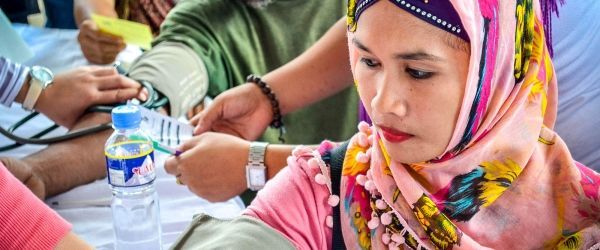
Our First Friend, Yantan
By a member of Team Hope | Southeast Asia
Yantan 1
was our first friend in our neighborhood, and one who got us well connected with others she knew here. We started to consider her and her husband, Banur, akin to family, while we were far from our own. She was one of those we went jogging with every Friday and spent time eating snacks together every Sunday.
In November, Yantan passed away. She died after being sick for three weeks with an untreated infection. We were following up with Yantan as she was sick and encouraging her to get checked up at a hospital, as were other family members. But, for a variety of reasons, she and Banur were resistant to getting treatment at a local hospital. Eventually, her husband decided they felt comfortable taking her four hours away to their hometown, to get treated at a small clinic where they knew a doctor. But Yantan did not receive optimal care there and did not improve after they returned home.
This loss has been difficult for us on many levels. First, this loss hurts because Yantan was a dear friend who we looked forward to continuing to get to know. Additionally, this is difficult because this situation depicts one of the many reasons we have chosen to live and work here in Southeast Asia. We won't ever know what exact illness killed Yantan, but it is very likely that it was an easily treatable infection when given proper medical attention. Many of the Miga 2
, Yantan included, don't feel welcome or cared for by hospitals and clinics. Even if they feel comfortable going, they are terrified of the crushing debt that their family will face after being treated. Even more, the Miga do not have equal access to education or other resources regarding their health. Therefore, it is more difficult for them to know what qualifies as an urgent medical situation.
Lastly, this situation is difficult because it highlights the spiritual fear and darkness that Yantan, and the Miga live in every day. Spiritual healers and rituals are more frequently turned to in times of sickness than conventional medicine. During a visit with Yantan while she was still sick, we asked about a piece of garlic she had pinned to her clothing. She said it was to protect her from any ill-intentioned people who looked at her. Now that Yantan has passed, her husband, Banur, is trying to make sense of her death. He blames certain symptoms she experienced as the work of evil spirits. It is likely that evil forces did have an impact on Yantan, but it is most likely that a physical illness killed her and caused these symptoms. Our hearts hurt to see her husband scared of the evil forces that hurt his wife as he searches to process it all, especially as we hold on to hope in Isa al-Masih 3
, the one who has conquered evil and is a light in the darkness.
We don't share this story for pity. We share it in order to paint a picture of reality here, and in hopes that you will pray with us. Yantan's story clearly depicts the need for continuing to be the presence of Isa through meeting the felt needs of the Miga, like health, education and empowerment. It also shows the need for bringing the message of Isa to the Miga, those who live in fear of darkness and have yet to experience the freedom of the light.
Will you pray?
- Pray with us as we strive to be the presence of Isa through meeting felt needs and deliver the message of Isa in our work here.
- Pray for Yantan's husband, Banur, her two sons, Naryan and Katuda, and the rest of her family, as they grieve this loss.
- Pray that the Lord would guide us in how to continue to be a support and comfort to this family, even while our hearts still hurt.
Additional Posts





